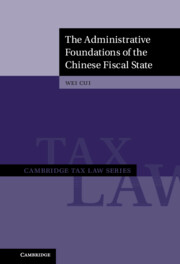Book contents
- The Administrative Foundations of the Chinese Fiscal State
- Cambridge Tax Law
- The Administrative Foundations of the Chinese Fiscal State
- Copyright page
- Dedication
- Contents
- Figures
- Tables
- Acknowledgments
- Abbreviations
- Introduction
- 1 The Forgotten Reform
- 2 What Is an Audit?
- 3 Atomistic Coercion
- 4 Returning Responsibilities to Taxpayers
- 5 Organizing Revenue
- 6 Policy Making without Information
- 7 The Rhetoric of Law
- 8 Varieties of State Capacity
- 9 Pivoting Away from the Rule of Law
- References
- Index
Introduction
Published online by Cambridge University Press: 24 March 2022
- The Administrative Foundations of the Chinese Fiscal State
- Cambridge Tax Law
- The Administrative Foundations of the Chinese Fiscal State
- Copyright page
- Dedication
- Contents
- Figures
- Tables
- Acknowledgments
- Abbreviations
- Introduction
- 1 The Forgotten Reform
- 2 What Is an Audit?
- 3 Atomistic Coercion
- 4 Returning Responsibilities to Taxpayers
- 5 Organizing Revenue
- 6 Policy Making without Information
- 7 The Rhetoric of Law
- 8 Varieties of State Capacity
- 9 Pivoting Away from the Rule of Law
- References
- Index
Summary
This chapter identifies the book’s two basic aims: (1) explaining what policy makers and scholars interested in building tax capacity in developing countries may learn from the Chinese experience; and (2) articulating a framework for understanding the politics of taxation in China. It then explains how the unique approach of the book, which focuses on ground-level tax administration, serves these two aims. In relation to the first aim, the book will argue that contrary to assumptions in the current literature, there are fundamentally different types of state capacity in taxation, which follow potentially irreconcilable choices in the face of difficult trade-offs. In relation to the second aim, the book uses the structure of tax administration to illustrate the heterogeneity of political incentives within the Chinese state, critical information bottlenecks, and the political motives behind invocations of law. Unifying the pursuit of these two aims is a reflective conception of law as a special form of securing social order, which sees legal ordering as fundamentally different from social ordering based on state coercion. A summary of the ensuing chapters follows.
Keywords
- Type
- Chapter
- Information
- Publisher: Cambridge University PressPrint publication year: 2022

